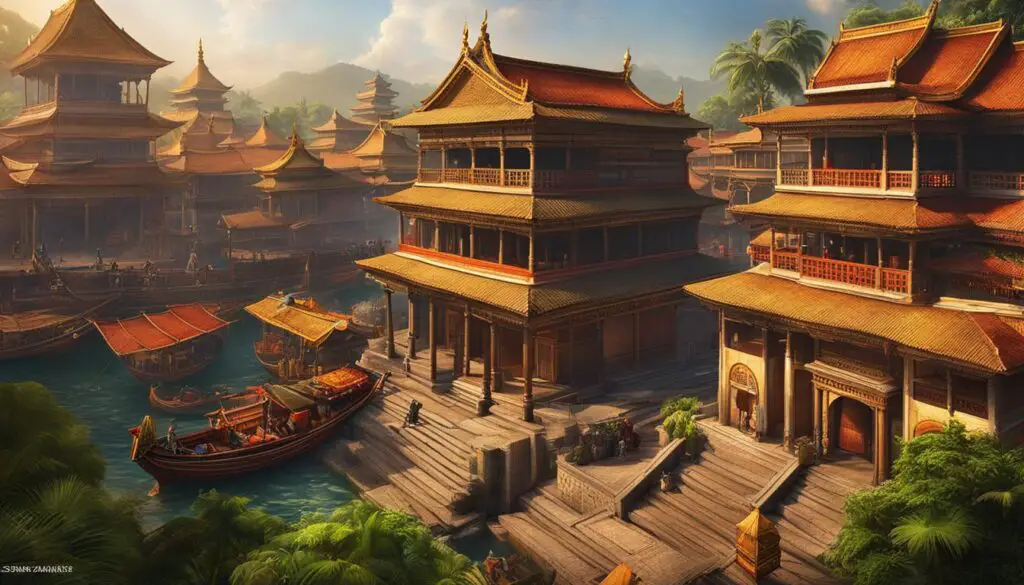Welcome to the land of Kerala, a captivating region located on the southwestern coast of India. Known for its breathtaking natural beauty and vibrant cultural heritage, Kerala has a history that spans centuries and is filled with fascinating tales of trade, religion, and dynastic rule.
When we delve into the history of Kerala, we uncover ancient trade routes that connected this region to the rest of the world, making it a hub for commerce and cultural exchange. Kerala’s strategic location along the Arabian Sea made it a crucial destination for merchants and explorers alike, leading to the flourishing spice trade that brought wealth and prosperity to the region.
But Kerala’s history goes far beyond trade and economic prowess. Its cultural heritage is equally compelling, with influences from various religions that have shaped the region’s identity. From the ancient temples that stand as a testament to the land’s deep-rooted spirituality to the synagogues that capture the Jewish heritage in Kerala, the cultural tapestry of this region is diverse and captivating.
As we explore the historical sites and artifacts of Kerala, we witness the legacy of colonial rule that left indelible marks on the land. The magnificent forts and palaces, remnants of a bygone era, transport us back in time and offer a glimpse into the opulent lives of the rulers of Kerala.
Join us on a journey through time as we unravel the layers of Kerala’s fascinating history and discover the hidden gems that make this land truly special.
Key Takeaways:
- Kerala’s history is intertwined with ancient trade routes that connected it to the rest of the world.
- The region’s cultural heritage is a blend of various religious influences.
- Kerala’s historical sites and artifacts offer a captivating glimpse into its rich past.
- The legacy of colonial rule can be seen in the majestic forts and palaces of Kerala.
- Exploring Kerala’s history allows us to understand the region’s deep-rooted traditions and customs.
The Enigmatic Port City of Muziris
Located on the picturesque Malabar Coast of India, Muziris holds a significant place in history as an ancient port city that played a pivotal role in trade with the Romans and Arabs. Its rich heritage and diverse cultural influences make it an intriguing destination for history enthusiasts and those curious about the region’s past.
Muziris, often referred to as “ancient Muziris,” was not only a bustling center of commerce but also a melting pot of various cultures. Merchants from far and wide, including the Romans and Arabs, flocked to this vibrant city to engage in the lucrative spice trade and exchange goods, creating a thriving hub of economic activity.
The evidence of Muziris’ prominence can be found in ancient Indian texts, as well as Greek and Roman records, which mention the city as a significant trading port along the maritime Silk Road. Its strategic location and proximity to the Arabian Sea made Muziris an ideal gateway for India’s flourishing trade with the outside world.
One of the most fascinating aspects of Muziris was its religious diversity. With traders visiting from different regions, the city became a meeting point for various faiths. Temples, mosques, and churches stood side by side, exemplifying the harmonious coexistence of different religious beliefs in Muziris.
Muziris was a crossroads of civilizations, where cultures connected, ideas were exchanged, and prosperity flourished.
“Travel back in time as you explore the mystical ruins of ancient Muziris, where history whispers its tales of trade, cultural fusion, and religious diversity.”
The Relics of Muziris
Muziris, though lost to the pages of history, has left behind a treasure trove of relics that bear witness to its glorious past. Archaeological excavations have unearthed remnants of ancient buildings, coins, pottery, and other artifacts, providing glimpses into the thriving commercial hub that once stood here.
To truly immerse yourself in the story of Muziris, visit the Muziris Heritage Project, a unique initiative that showcases the archaeological findings and preserves the city’s heritage. This interactive museum offers a captivating journey through time, allowing visitors to walk amidst the remnants of ancient structures and gain a deeper understanding of Muziris’ role in shaping India’s trade history.
As you uncover the secrets of ancient Muziris, you will be transported to a bygone era, where the spirit of global exchange and cultural amalgamation thrived.

| Ancient Muziris | Highlights |
|---|---|
| Strategic Location | An ideal port city along the maritime Silk Road for trade with the Romans and Arabs. |
| Religious Diversity | A melting pot of cultures, where temples, mosques, and churches coexisted harmoniously. |
| Archaeological Remnants | Unearthed artifacts and ruins that showcase the city’s glorious past and trade connections. |
The Majestic Forts of Bekal
Bekal, a coastal town situated in northern Kerala, boasts the awe-inspiring Bekal Fort, a true marvel of historical significance and architectural brilliance. Built in the 17th century, this magnificent fort stands proudly along the stunning shores of the Arabian Sea.
The design of Bekal Fort is truly unique, featuring keyhole-shaped slots that were once used for cannons, showcasing its rich military past and strategic importance. Exploring the fort’s observation towers and hidden underground passages offers visitors a glimpse into the region’s fascinating history.
What truly sets Bekal Fort apart is its breathtaking natural beauty. The fort overlooks the Arabian Sea, offering panoramic views that are simply mesmerizing. The combination of a historical marvel with stunning vistas creates an unparalleled experience for those who visit.
FAQ
What is the history of Kerala?
Kerala has a rich history that includes ancient trade routes, diverse religious influences, and the legacy of colonial rule.
What is the cultural heritage of Kerala?
Kerala is renowned for its cultural heritage, which is reflected in its historical sites and artifacts that showcase vibrant traditions.
What were the ancient trade routes in Kerala?
Kerala was a significant hub of trade in ancient times, with the port city of Muziris playing a crucial role in the lucrative spice trade and attracting merchants from all over the world.
Tell me more about Muziris.
Muziris was a thriving port city located on the Malabar Coast of Kerala. It was mentioned in ancient Indian texts and even Greek and Roman records. The city was a melting pot of cultures, with trade connections to the Romans and Arabs.
What is the historical significance of Bekal?
Bekal, a coastal town in northern Kerala, holds historical significance due to the majestic Bekal Fort. This 17th-century fort showcases the region’s architectural prowess and military past.
What are the unique features of Bekal Fort?
Bekal Fort is known for its unique design, including keyhole-shaped slots for cannons. It also offers observation towers, underground passages, and stunning panoramic views of the Arabian Sea.
What is the natural beauty of Bekal?
In addition to its historical importance, Bekal boasts natural beauty with its location along the Arabian Sea, providing visitors with breathtaking coastal views.
